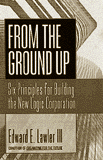"From the Ground Up: Six Principles for Building the New Logic Corporation" by Edwin E. Lawler
From the Ground Up: Six Principles for Building the New Logic Corporation by Edwin E. Lawler 3d (299 pages, Jossey-Bass Publishers, 1997)
(originally published by Booz & Company)
 In his new survey of recent management thinking, Edwin E. Lawler 3d acknowledges that his is a field plagued by fads and gurus du jour, upon which companies willingly thrust hundreds of thousands of consultancy dollars for what is usually a quick fix and a relapse.
In his new survey of recent management thinking, Edwin E. Lawler 3d acknowledges that his is a field plagued by fads and gurus du jour, upon which companies willingly thrust hundreds of thousands of consultancy dollars for what is usually a quick fix and a relapse.
Mr. Lawler, himself a consultant and professor at the University of Southern California Graduate School of Business, warns in From the Ground Up: Six Principles for Building the New Logic Corporation that true corporate change cannot be accomplished with just a re-engineer hither and a TQM thither. Effective change must be thoughtful and thorough — as the title says, "from the ground up."
At this point in the evolution of the management workshop, it would be surprising if Mr. Lawler's principles surprised anyone. He declares the old authoritarian, Taylorist ways of production dead. He denounces bureaucracy as ineffective. He deflates the pretensions of top management and technical experts. Organizations must flatten, allowing for lateral, rather than hierarchical, processes. Employees, rather than managers, must add the most value. Companies should exist to create products and serve customers, not to perpetuate their own existence. Leadership, not organizational structure, is the key to effectiveness.
Yet if the ideas are not unfamiliar, Mr. Lawler makes them sound fresh by doing what he urges his clients to do — being thoughtful and thorough.
He puts the familiar fragments of management ideas into context and carefully delineates the links between different corporate practices that may seem far afield from one another. His is what anthropologists would call a holistic approach: To understand an entity — an organization, for example — one must understand the whole of the constituent elements that make it up and how they are related to each other. One area can be used to analyze another. What has a customer-service orientation to do with employment practices? By Mr. Lawler's logic, a company that treats customers well probably treats its employees well — and vice versa.
The problems many companies have implementing change can be traced in part to their lack of clarity about why they undertake major corporate change projects.
The corporate upheavals of the last six or seven years have created a climate of change, but that in itself isn't enough to justify a major commitment to overhauling a company. Like the lightbulb in the old how-many-therapists-does-it-take-to-change-a-lightbulb joke, a company really has to want, to need, to change, Mr. Lawler contends. It needs leadership from the top — not from a renegade visionary or an H.R. functionary in the middle ranks — to rally the troops. And the leadership must have the patience to take the long view. The great corporate-change success stories, like Xerox, didn't happen overnight. Mr. Lawler also counsels against, as he says, "waiting for heroes." Most companies aren't led by solo-operator chief executives with the juice of a Jack Welch or a Michael Eisner, and don't need to be.
Unlike many converts to the true cause of corporate change, Mr. Lawler does not see the evisceration of the work force as merely a regrettable side effect of inevitable economic changes. His experience is that downsizing, used injudiciously, is likely to become a symptom of rot, rather than a sign of financial health.
"You cannot shrink to greatness," he cautions companies that return again and again to cutting workers, even when business conditions and the company's own health have been restored. Such a company is unlikely to be able to prevent defections among its best workers, or to invest in its future or to cultivate new business. A company that hunkers down, he argues, is a company risking a "death spiral."
It is a sign of the comprehensiveness of Mr. Lawler's book that he includes material that could actually be career advice for individuals rather than subject matter for a study of new forms of management.
But his analysis of what the new corporate logic will mean for revising the received wisdom about career paths and success should be useful for companies wanting to retain ambitious employees as well as for employees who want to maximize their opportunities. Employees may not have the same degree of job security that they once did, but they do have incentives and opportunities to gain a more rewarding and — for those in cutting-edge fields — more profitable work life. By the same token, companies may be giving up the benefits of having a stable, long-term work force, but they are likely to gain happier, more productive employees.
From the Ground Up is likely to be useful to anyone coming late or reluctantly to the rowdy seminar table of corporate change or to anyone, perhaps a senior executive wondering why he or she embarked on a major change initiative, who needs a good, thorough refresher course.
It is a sane, modulated, rationale-cum-explanation for the sea changes — economic, social, commercial — that so many Americans and the companies they work for are struggling with now. ![]()


